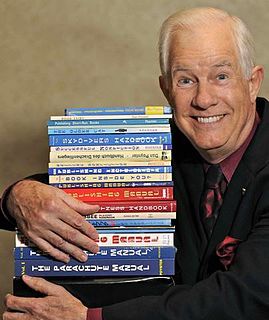A Quote by F. Scott Fitzgerald
Great books write themselves, only bad books have to be written.
Quote Topics
Related Quotes
Only idiots or snobs ever really thought less of 'genre books' of course. There are stupid books and there are smart books. There are well-written books and badly written books. There are fun books and boring books. All of these distinctions are vastly more important than the distinction between the literary and the non-literary.
The most important thing for a writer to do is to write. It really doesn't matter what you write as long as you are able to write fluidly, very quickly, very effortlessly. It needs to become not second nature but really first nature to you. And read; you need to read and you need to read excellent books and then some bad books. Not as many bad books, but some bad books, so that you can see what both look like and why both are what they are.
When you realize my best selling books are 'Owl Moon,' the 'How Do Dinosaur' books, and 'Devil's Arithmetic,' how can the public make sense of that! I have fans who think I only write picture books or only write SF and fantasy. I have fanatics of my poetry and are stunned to find out I write prose, too!
One wouldn't want to say that what makes a good writer is the number of books that the writer wrote because you could write a whole number of bad books. Books that don't work, mediocre books, or there's a whole bunch of people in the pulp tradition who have done that. They just wrote... and actually they didn't write a whole bunch of books, they just wrote one book many times.
The books in Mo and Meggie's house were stacked under tables, on chairs, in the corners of the rooms. There where books in the kitchen and books in the lavatory. Books on the TV set and in the closet, small piles of books, tall piles of books, books thick and thin, books old and new. They welcomed Meggie down to breakfast with invitingly opened pages; they kept boredom at bay when the weather was bad. And sometimes you fall over them.
Well, I hate it when authors come into a school and they say to kids, 'Write from your heart, only write what you know, and write from your heart.' I hate that because it's useless. I've written over 300 books - not one was written from my heart. Not one. They were all written for an audience, they were all written to entertain a certain audience.
There are a lot of people out there who will write books, in which everything turns out nicely and the bad guys lose, the good guys win, the boy gets the girl and they live happily ever after. There's a million books like that and if that's the comfort you're looking for, you should read those books and not my books because that's not the kind of book that I am interested in.
I write about the period 1933-42, and I read books written during those years: books by foreign correspondents of the time, histories of the time written contemporaneously or just afterwards, autobiographies and biographies of people who were there, present-day histories of the period, and novels written during those times.






































